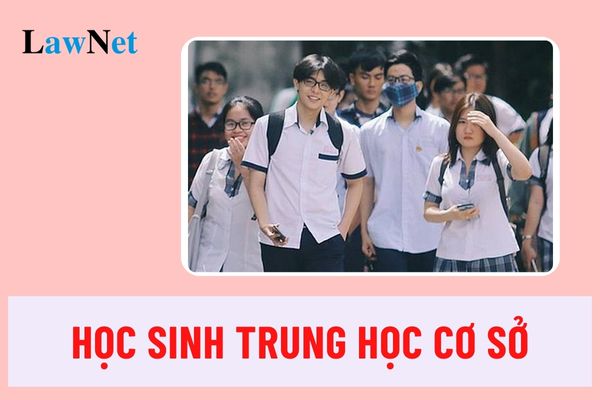What are requirements for the essential qualities of lower secondary school students in Vietnam?
What are 05 requirements for the essential qualities of lower secondary school students in Vietnam?
According to the regulations in the General Education Program issued with Circular 32/2018/TT-BGDDT, 5 essential qualities of lower secondary school students include:
(1) Patriotism
(2) Benevolence
(3) Diligence
(4) Honesty
(5) Responsibility

What are requirements for the essential qualities of lower secondary school students in Vietnam? (Image from the Internet)
What are the requirements to achieve the 5 essential qualities of lower secondary school students in Vietnam?
According to the regulations in the General Education Program issued with Circular 32/2018/TT-BGDDT, the requirements for achieving the 5 essential qualities of lower secondary school students according to the 2018 General Education Program are clearly stated as follows:
(1) Patriotism
- Actively participating in activities to protect nature.
- Being conscious of exploring the traditions of family, lineage, and hometown; actively studying and training to promote the traditions of family, lineage, and hometown.
- Being conscious of protecting cultural heritage, actively participating in activities to protect and promote the values of cultural heritage.
(2) Benevolence
Loving people
- Respecting the honor, health, and private life of others.
- Not agreeing with evil, bad behaviors; not promoting, not participating in violent acts; ready to defend the weak and disadvantaged...
- Actively participating in charitable activities and community service activities.
Respecting differences among people
- Respecting the differences in perceptions and personal styles of others.
- Respecting the cultural diversity of ethnic groups in the Vietnamese national community and other ethnic groups.
- Empathizing and willing to help others.
(3) Diligence
Eager to learn
- Always striving for good results in learning.
- Enjoy reading books, newspapers, seeking information on the Internet to broaden knowledge.
- Conscious of applying the knowledge and skills learned at school, from books, and other reliable sources into daily life and learning.
Hardworking
- Participating in household labor and production work according to practical requirements, suitable to one's abilities and conditions.
- Always striving for good results in school and community labor.
- Conscious of learning well in subjects and vocational content; knowledgeable about a common profession.
(4) Honesty
- Always being consistent between words and actions.
- Seriously reflecting on one's shortcomings and taking responsibility for all one's words and actions.
- Respecting the truth; defending rightness before others; being objective and fair in perception and behavior.
- Not infringing on public property.
- Fighting against dishonest behaviors in learning and life.
(5) Responsibility
Being responsible for oneself
- Having the habit of maintaining hygiene, physical training, and health care.
- Conscious of preserving and rationally using personal belongings.
- Conscious of saving time; using time rationally; building and implementing a reasonable study and living schedule.
- Not blaming others; being conscious and finding ways to remedy the consequences one has caused.
Being responsible for the family
- Caring about family affairs.
- Conscious of saving in personal and family expenses.
Being responsible for school and society
- Caring about community affairs; actively participating in collective activities and community service activities.
- Respecting and adhering to public place rules; well adhering to traffic laws; being conscious when participating in community activities and local festivals.
- Not agreeing with behaviors that do not conform to cultural norms and public regulations.
- Connecting and participating in the Internet and social networks appropriately; not aiding wrongdoers in spreading information that affects the reputation of organizations or individuals, or affects the cultural norms, public order, and safety.
Being responsible for the living environment
- Living in harmony and friendliness with nature.
- Being conscious of exploring and ready to participate in propagating activities, caring for, and protecting nature; opposing acts that harm nature.
- Being conscious of exploring and ready to participate in propagating activities about climate change and responding to climate change.
Which grades do lower secondary school students in Vietnam belong to?
According to the regulations in Clause 1, Article 28 of the Education Law 2019:
Levels and Age of General Education
1. Levels and age of general education are regulated as follows:
a) Primary education is implemented over 5 academic years, from grade one to the end of grade five. The age of students entering grade one is 6, calculated by year;
b) Lower secondary school education is implemented over 4 academic years, from grade six to the end of grade nine. Students entering grade six must complete the primary education program. The age of students entering grade six is 11, calculated by year;
...
Lower secondary school students are those studying from grade 6 to grade 9.

